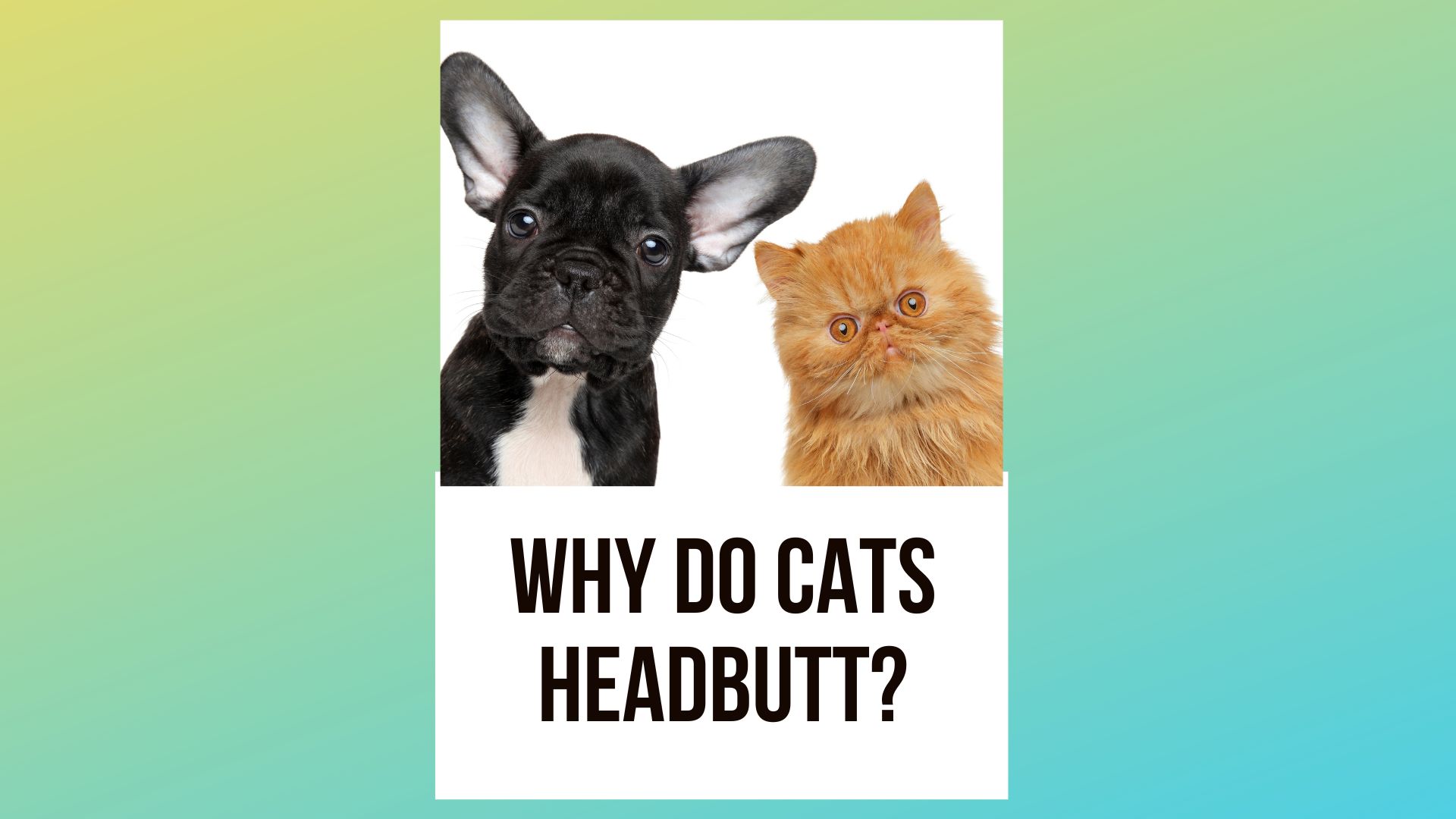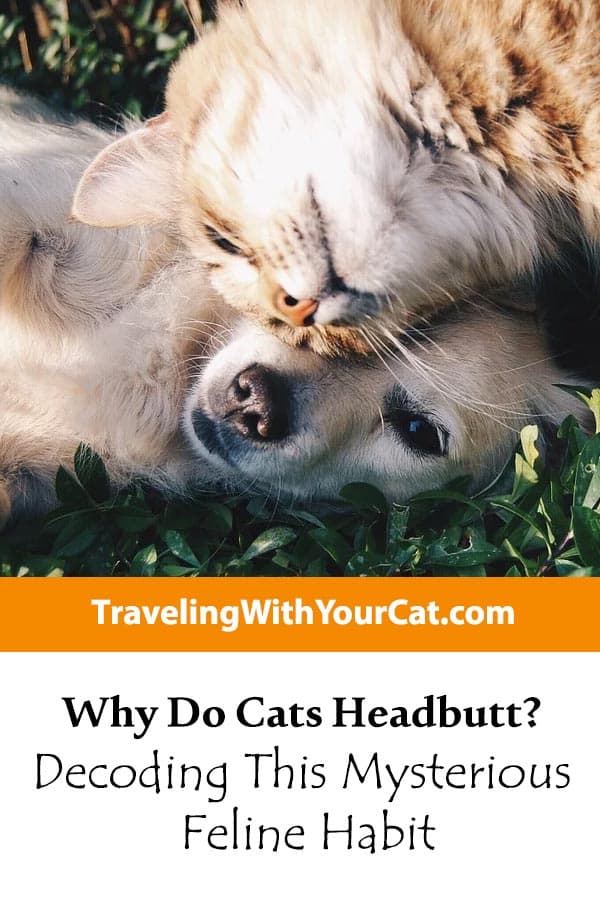
Cats are perhaps the most mysterious of all companion animals. That might be one of the reasons we love them so much!
Because one thing is certain – no matter how confusing we think a cat’s behavior might be, it always makes perfect sense to your cat.
Headbutts are a classic example of this type of behavior. Your cat has to go out of its way to do it and you have no idea why.
In this article, learn the real name for headbutts, what this behavior means, why cats do it, and the best way to respond if your cat headbutts you.
Why Do Cats Headbutt
Cats headbutt as a form of greeting. Headbutting is technically called bunting and it is considered one of the most significant social behavior among felines.
Often headbutts will be accompanied by rubbing up against you to deposit scent pheromones. This is a territorial marking behavior.
Learn Why Headbutts Are Meaningful to Cats
In this short YouTube video, a professional animal behaviorist explains what head butting means to your cat and why they do it.
Also, learn more about related behaviors your cat might do that are meaningful for felines.
What Is Headbutting and Why Is It Called Bunting
The Rescue Vets explains that head butting is actually called bunting.
Bunting is just the technical term that animal researchers have given to behavior that helps to release scent hormones located on a cat’s head.
This release of scent pheromones, or special signature chemicals that are kind of like a cat’s calling card, is important for marking territory and establishing social bonds.
In fact, cat bunting is a lot like what humans do when they shake hands to greet each other.
What Does a Cat Feel During Headbutting
You might wonder whether cats enjoy head-butting one another (or you) or if they just do it to mark territory or say hello.
As Tufts School of Veterinary Medicine explains, head butting likely relates all the way back to when your cat was just a tiny kitten.
Researchers believe that head butting is related to kneading and rubbing (called allorubbing) behaviors a young kitten will use to nurse or seek attention from the mother cat.
Even into adulthood, most cats will retain a natural enjoyment of having their heads kneaded and rubbed by other cats or their humans.

Is Headbutting Unique to Cats
Headbutting or bunting other places on the body is not just reserved for felines. In fact, very similar behaviors have been observed in a diverse group of species including horses, cattle, and wild cats like lions.
But different species use bunting or head butting for different purposes. In some animal groups, bunting takes place between the young and their mother during nursing.
While, In other species, animals may use bunting to work out issues of dominance and submission within the group.
In cats, headbutts and allorubbing seem most closely associated with territorial marking, self-soothing, socialization rituals, and communication through the release of scent pheromones.
This makes it easier to figure out why your cat might headbutt you and what it means, which we will discuss in the next section here.
How Does Headbutting Help a Cat Mark Their Territory
While headbutts are a sign of territorial marking behavior in felines, this behavior isn’t done for the reasons most people assume.
It is actually done as a way for a cat to mark out a safe zone using its own pheromones as signals.
When a cat headbutts something or someone, they are stamping that item or being with a scent signature that is the feline equivalent of an “all clear.”
And so, as Vetstreet highlights, cats that headbutt their humans are basically saying “I trust you.”
While you may not be delighted with the idea of walking around all day with cat scent pheromones smeared on your forehead or leg, at least you won’t be able to smell them. Pheromones are scent markers that only other cats can pick up on.
What Should You Do If Your Cat Headbutts You
Every day somewhere, a cat owner gets headbutted by their feline for the very first time.
That adds up to a lot of confused cat owners who are wondering what to do next? Should you headbutt your cat right back? Stand still? Walk away? Say thank you?
What is the right response to being bunted by a cat?
As Vet Organics highlights, there isn’t just one right response to head butting.
If you are in a position to do so, you might try very gently head-butting your cat back.
Another option would be to give your cat some gentle pats and head rubs.
What about treats? Treats can be a good way to thank your cat for a headbutt, but only if you don’t use them every time. Otherwise, your cat may begin to associate headbutts with treats and will do the behavior all the time!

Is There Something Wrong If Your Cat Doesn’t Headbutt You
You may be a cat owner who is reading this and feeling worried because your cat never headbutts you.
Feline behavior experts say this is not something you need to worry about.
Headbutting is one method of communicating with you and other animals. But it is far from a cat’s only communication tool.
Not all cats will headbutt but all cats develop their own ways of showing affection to people and animals they view as safe and trustworthy.
Purring, allorubbing, allogrooming, licks, gentle nips, cuddles and small rodent “presents” are all ways that cats can show affection to their people.
So if your cat does not headbutt you, it just means they are using a different type of communication method to show you affection.
What Headbutting Is Not: Headbutting Vs Head Pressing
As Catonsville Cat Clinic emphasizes, headbutts are used to communicate love, affection, safety, and trust.
This is quite a different behavior from something feline veterinarians call head pressing.
Head pressing looks different and means something very different.
When a cat presses their head firmly against a solid surface such as a wall, floor, or object, this is an indication of possible neurological damage.
A headbutt is a quick and (usually) gentle bump against something or someone. A head press, in contrast, is serious and sustained mashing of the head into the object or surface.
A cat that engages in head pressing behavior is potentially reacting to damage in the central nervous system. The cat may be uncomfortable or in pain.
Where head butting may be accompanied by gentle purrs, head pressing may include what veterinarians call “abnormal vocalization” and these typically will not be sounds of pleasure.
Because head pressing could stem from a number of causes, it is vital to bring your cat to a qualified feline veterinarian for testing, diagnosis, and treatment.
Other Messages Your Cat Uses Headbutts to Send You
Cat Behavior Associates points out that your cat may also use headbutts like the proverbial memo to send specific messages.
Common headbutt messages include requests for you to pet them, feed them, groom them, scratch them, cuddle them or even just pay attention to them.
This is similar to how two cats might communicate or how a kitten might communicate with a mother cat.
Ultimately, cat headbutt behavior is a positive sign of trust and affection between a person and a cat.

Hi, This is Alexa, and I love cats. This Website is a Complete Journal about how to travel with a cat and other information about Cat Health, Cat Training, Cat Behavior, Cat Foods and more. I hope you find it useful.
